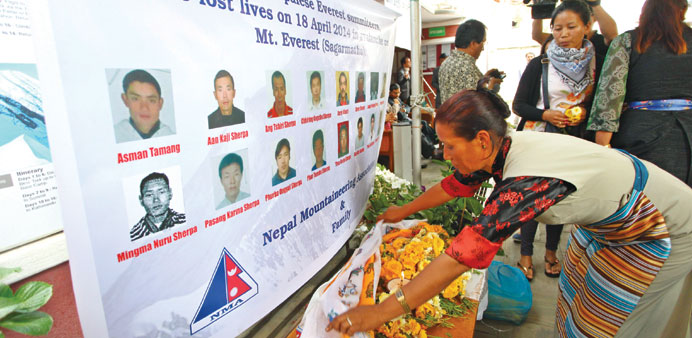A relative of a deceased mountaineer offers prayers to the dead mountaineers of an avalanche one year ago during a memorial programme at Nepal Mountaineering Association in Kathmandu yesterday.
AFP/Kathmandu
Hundreds of mountaineers and Sherpas in Nepal paid emotional tribute yesterday to 16 of their fellow guides who died in an avalanche on Everest a year ago, suspending climbing for the day.
The avalanche tore through a group of Sherpas who were hauling gear up the mountain on the morning of April 18, 2014, sending shock waves through the climbing community.
The disaster triggered an unprecedented shutdown of the 8,848m (29,029ft) mountain, fuelling demands for better compensation as well as higher death and injury benefit payouts to the Sherpas’ families.
“All teams here have decided not to climb today to mourn the friends we lost last year,” Pasang Sherpa, a mountaineering guide at Everest base camp, said.
“My heart races when I look at the icefall. It is a sad day for us,” added Sherpa, who was at the camp when the avalanche hit last year.
Monks in Kathmandu chanted prayers and played traditional music in a monastery surrounded by family members of one of the avalanche victims, Ang Kaji Sherpa, a single father with five children.
“There is a vacuum in our family, no one to guide or scold us. We are on our own,” his 20-year-old daughter, Chhechi Sherpa, said with tears in
her eyes.
“It is hard. I am the head of the family now, looking after my siblings and our home. Our uncles and aunts are there, but no one can be like our father.”
Team leaders of expedition groups gathered at the Everest base camp to observe a moment of silence for the victims, while others held small memorial services.
The tragedy exposed the huge risks Sherpas take to ensure the safety of the expeditions by making multiple trips to fix ropes and haul gear up the mountain.
“After the avalanche, many questions were raised about the safety and security of the guides that are the backbone of this industry,” said Ang Tsering Sherpa, president of Nepal’s
mountaineering association.
To provide more security, the government yesterday announced the creation of a welfare fund to support victims of mountaineering accidents.
“This day is a tragic reminder that we need to work together to make it safe for those who work in this business and promise security for their families,” said Tulsi Gautam, Nepal tourism department chief, at an event in Kathmandu to mark the first
anniversary.
Following the disaster, Nepal altered the traditional climbing route to the peak in a bid to boost safety and allay concerns. It has also decided to station doctors and upgrade weather forecasting systems.
Mountaineering is a huge revenue earner for the impoverished Himalayan country, home to eight of the world’s 14 peaks over 8,000m.

